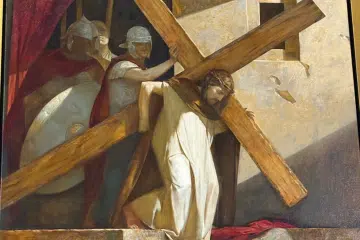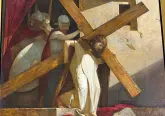Guide to fasting offers helpful information for Lenten discipline

IMAGE: CNS
By Laura Ann Phillips
PORT OF SPAIN, Trinidad (CNS) — On Feb. 26, 1970, 200 angry youths stormed the Cathedral of the Immaculate Conception in Port of Spain, draped its statues in black cloth and criticized the church on its failure to challenge race and class imbalances in Trinidad and Tobago.
Fifty years later, to the day, the Catholic Church and the National Joint Action Committee — the leading body of the local Black Power movement — came together in that same cathedral for a joint observance of the 50th anniversary of Trinidad and Tobago’s Black Power Revolution.
In his address at the Ash Wednesday service, Archbishop Jason Gordon noted that this was a day on which the universal church gathered for repentance.
"Today, as archbishop of Port of Spain, I ask forgiveness for the way that we, as church, have not been more diligent about the development of our people: for the ways that we have held prejudice, for the ways that we have been snooty, for the ways that we have not given example to this people of what it is to build a wonderful nation."
He referred to the "soul wound" of the country that "manifests itself in the young boys that pick up guns; in the mothers who have no fathers in their households; in the children growing up with no fathers around; in the high violence that this has brought."
"But, one of the things we have not had the courage to say in our country," said Archbishop Gordon, "is that a lot of what we’re dealing with … is also driven from another source: that we, as a nation, have disregarded or ignored the economic underdevelopment of our black people in this country.
"Pockets of our country have been left underdeveloped. We have to have a blueprint for African development in Trinidad and Tobago."
Over the centuries, free land grants to English and French settlers, African slavery and East Indian indentureship spawned a society where wealth remained exclusively in the hands of whites and those of partial white ethnicities. In the book "Black Power Day: The 1970 Revolution," journalist Raoul Pantin noted that white assets "would be handed down for generations." All other groups held poverty and disease, their advancement denied well into the 20th century.
Kwasi Mutema, head of the National Joint Action Committee, said the 1970 revolution "was an effort to create a new spirit, an effort to create a new society."
The U.S. Black Power movement of the 1960s heavily influenced many Caribbean territories. At that time, one by one, these were obtaining political independence from England; Trinidad obtained independence in 1962.
Six years later, a dispute between Caribbean students and the administration of the Sir George Williams University in Montreal over allegations of a professor deliberately failing black students sparked long-simmering tensions in Trinidad and Tobago.
On Feb. 26, 1970, students of the University of the West Indies entered the Royal Bank of Canada on Independence Square for a peaceful protest of the treatment of those Caribbean students, said Khafra Kambon, a founding member of the action committee.
Riot police hurled them out of the bank, he said, but the demonstration continued, moving eastward along the square.
"The demonstration was very disciplined," Kambon recalled. "I don’t know who (said it); I know there was a cry, ‘Into the church!’ And the demonstration went into the Catholic cathedral."
Newspaper photos of the time show demonstrators crowded into the sanctuary and around the altar, seated in the bishop’s chair, placards and black cloth draped over the statues.
"The church has had us praying to white faces for centuries. I don’t think it is psychologically healthy," Kambon told about 200 people at a commemorative march Feb. 26. "In every culture, where people have not been enslaved, they represent God or any deity in their own image. The way we got them to represent us was by draping black cloth over some of the white faces."
Archbishop Gordon said that black cloth was "symbolic that there was something that the church must take on, that she had not been able to take on, up until that time."
Two years before the revolution, he noted, Archbishop Gordon Pantin had been installed as Trinidad’s first local ordinary.
"For two years, the local archbishop was struggling to understand how to move the church forward," said Archbishop Gordon. "The events of 1970 catapulted the church in new directions. It broke the mold of the past and it opened a new mold for the future."
For instance, he said, "Most of our priests were foreign missionary priests who occupied the cathedral. They left the cathedral after 1970, allowing the first local priests to become the administrators of the cathedral."
Mutema said the cathedral incident "marked a series of events that led to a significant transformation, not just of the Catholic Church, but the spiritual life and the religious landscape of the Caribbean."
Archbishop Pantin made the church’s first apology back in 1999, said Archbishop Gordon.
"In his official capacity as archbishop, (he) came to the cathedral in a service where he asked forgiveness for whatever way the Catholic Church had been complicit in racism, in sexism, in classism and the prejudice in the society.
"He said that the church has not always been on the right side of history and has not always acted appropriately as a mother should to all of her children."
"I have to congratulate the Catholic Church for its response," said Mutema, "because, in the face of that criticism, the church listened. They listened, and they went further than that to make amends and made drastic changes to their institution."
– – –
Copyright © 2020 Catholic News Service/U.S. Conference of Catholic Bishops. www.catholicnews.com. All rights reserved. Republishing or redistributing of CNS content, including by framing or similar means without prior permission, is prohibited. You may link to stories on our public site. This copy is for your personal, non-commercial use only. To request permission for republishing or redistributing of CNS content, please contact permissions at [email protected].













